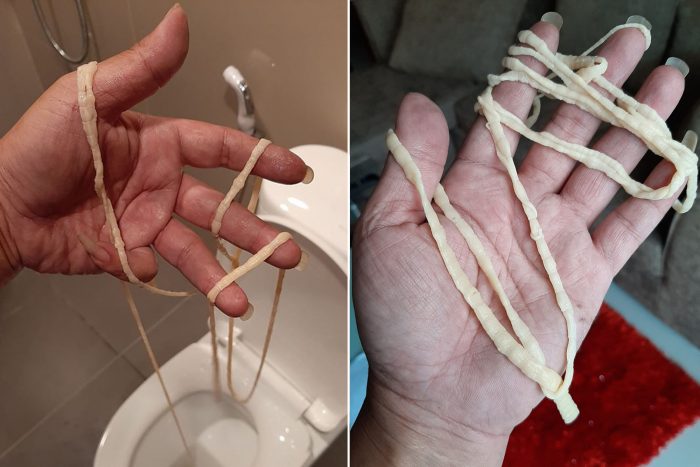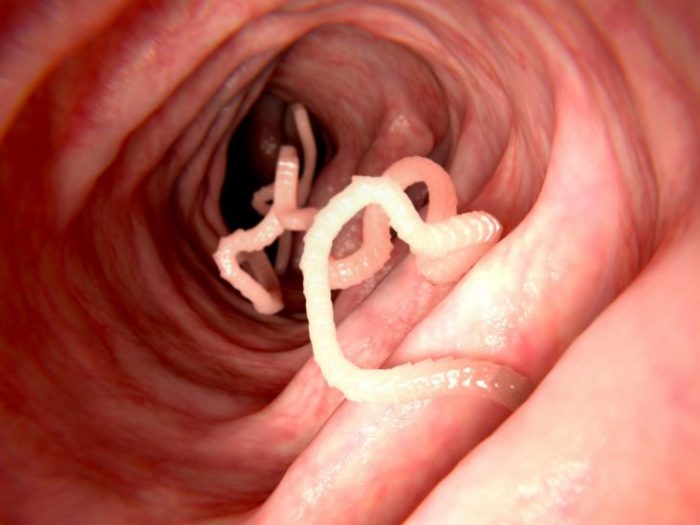Tapeworm. As interesting as the name sounds, tapeworms in humans can cause serious health issues. If left untreated, they can even be fatal. Tapeworms live as a parasite in the intestines of humans and other mammals.
Though the thought of having a tapeworm in your gut can be gut-wrenching, treatment is 95% effective. If you get treatment quickly, you can recover fully without any side effects.
Here’s all you need to know about tapeworms in humans.
What Are Tapeworms in Humans?
Table of Contents
Tapeworms are a type of parasitic worm from the phylum Platyhelminthes. They are almost flat and have negligible thickness. They look like thick tape, hence the name.

A tapeworm can get as long as 25 meters in a host. That’s about three times the length of a bowling lane. Moreover, an adult tapeworm could produce up to 2,000 proglottids and 100,000 eggs at once. If a tapeworm lays eggs in your guts, imagine having a hundred thousand tapeworms roaming around in your body.
The Entry and Exit of Tapeworms in Humans
The biggest question you must have is how tapeworms enter your body. Tapeworms can only enter your body through infected meat, i.e., if you eat animal meat containing tapeworm larvae.
Tapeworms have three life stages: egg, larvae, and adulthood. While adult tapeworms tend to linger in the intestine, larvae can enter the muscles of their hosts. If you eat raw meat containing tapeworm larvae, they’ll enter your body, thus infecting you.
Five types of tapeworms are known to enter the body. These are:
- Fish tapeworm
- Beef tapeworm
- Dog tapeworm
- Pork tapeworm
- Dwarf tapeworm
In rare cases, tapeworms can pass from one person to another. Since tapeworms pass through bowel movements, an infected person who doesn’t wipe properly before cooking food can give tapeworms to others.
How Do Tapeworms Leave the Human Body?
Many tapeworms exit through bowel movements. Same tapeworms may stick to your intestines. In that case, the doctor will give medicine to kill tapeworms, which will then come out through bowel movements. In rare cases, doctors could recommend surgery to remove tapeworms. We’ll discuss more about tapeworm removal in later sections.
Different Causes of Tapeworms in Humans
We discussed briefly in the previous section how tapeworms enter the human body. Let’s take a detailed look at different causes of tapeworm infection in humans.
Ingesting Tapeworm Eggs
Tapeworms can get into the human body through contaminated food, water, or soil. Sometimes, tapeworms lay their eggs in the soil. If someone comes in contact with that soil and doesn’t wash their hands properly, they can transmit those eggs to food, water, or other things. If someone else ingests infected food or water, they will get a tapeworm infection.
Eating Infected Meat
The most common cause of tapeworm infection in humans is the consumption of infected meat. As discussed, tapeworm larvae can enter a host’s muscles. If you eat raw or uncooked meat, it can enter your body. Once they enter your body, they can live up to 20 years, get up to 25 meters tall, and stick to the intestinal walls.
Human-Human Transmission
As mentioned earlier, tapeworms can pass through stool, which is a good thing. But if someone doesn’t wash their hands properly after wiping and touching food or water afterwards, they can transmit tapeworms to other people.
Insect-Human Transmission
Sometimes, fleas like house flies and beetles may pick tapeworm eggs from the excreta of infected animals like rodents. If these fleas come in contact with food or water, they can transfer tapeworm eggs. Ingesting these eggs can cause tapeworm infection.
Symptoms of Tapeworm in Humans
Now that you know the common causes of tapeworm infection, let’s look at some symptoms of the infection. Here are some common signs to watch out for:
- Eggs, larvae, or tapeworm segments in stool
- Abdominal pain
- Nausea and vomiting
- Fatigue and weakness
- Weight loss
- Poor appetite
- Intestinal inflammation
- Malnutrition
- Convulsions and balance disorders (severe cases)
If you experience one or more of these symptoms, contact your doctor for further investigation.
Most tapeworm infections are not serious, even if caught at a late stage. However, some complications of tapeworm infection may occur. For example, if a tapeworm larva enters the brain, it could cause serious complications and even death.
Removal of Tapeworms in Humans
Thanks to medical advancements, surgery is rarely needed for tapeworm infection. Anti-parasitic medications like praziquantel and nitazoxanide can kill a tapeworm. Once the tapeworm dies, it will pass through the stool.

If the infection has caused intestinal inflammation, your doctor may prescribe anti-inflammatory drugs.
If tapeworm larvae enter other organs, they may cause life-threatening cysts. In that case, your doctor may suggest surgery to remove the cyst.
How to Prevent Tapeworms from Entering Your Body?
Finally, what can you do to avoid tapeworms from entering your body? It’s clear that lack of hygiene is the biggest facilitator of a tapeworm infection. Therefore, it’s essential to ensure cleanliness and hygiene around you. Here are a few steps you can take to prevent tapeworm infection.
- Maintain good hygiene. Wash your hands properly after using the toilet or coming in contact with soil or other potentially dirty areas. Also, always wash your hands before eating.
- Never eat raw or uncooked meat. If you buy raw meat, cook it to at least 150°F (66°C) for a few minutes. Doing so will kill any larvae or eggs in the meat.
- If you live in an area where tapeworms are common, wash fruits and vegetables with clean water and cut them before eating.
- If you have dogs, cats, or other pets, treat them for tapeworms and pay close attention to what they eat. Make sure they don’t eat food from trash cans or other potentially dangerous sources.
Wrap Up
Tapeworm infection is rare, but it can cause serious problems if you get it. The good news is that tapeworm infection treatment has a 95% effectiveness rate. Therefore, if you notice any symptoms of tapeworm infection, contact your doctor immediately. You can prevent tapeworm infection by maintaining good hygiene and eating fresh and properly cooked meat.
So, what’s your take on tapeworm infection?

